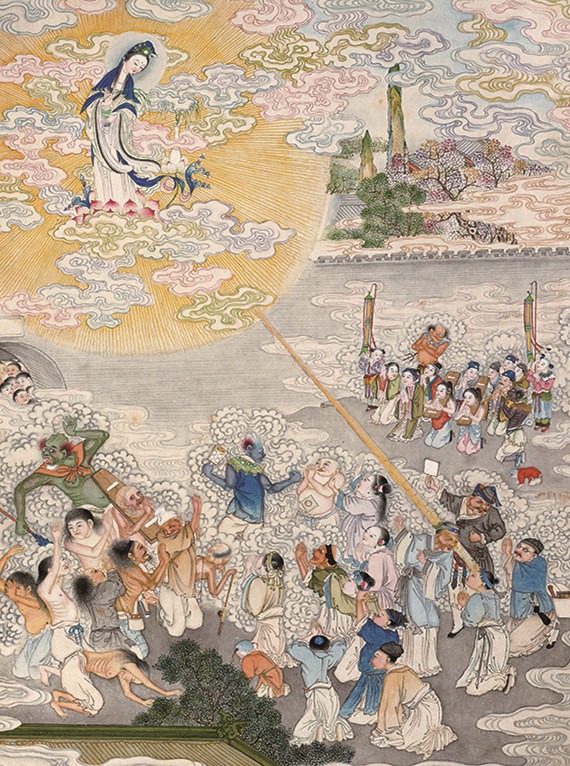chinese mythology
Chiyou/蚩尤: Chinese God of War
- Who is Chiyou/Chi You?
- Chi You As the God of War and Master Weapon Smith
- Chiyou in Chinese Mythology
- Different Versions of the Chiyou Myth
- Chiyou’s Cultural Influence
- Reference
Who is Chiyou/Chi You?

- Name: Chiyou
- Parentage: Offspring of Yan Di, also known as the Flame Emperor
- Title: God of War
- Attributions: Credited with inventing military weapons
- Rebellion Against Huang Di:
- Rebelled against Huang Di, his father
- Faced defeat in the ensuing war and met his demise
- The chains that bound him transformed into a maple tree
- Weapon Creation:
- Created weapons such as the spear, dagger-axe, sword, and halberd
- Different versions depict him with numerous brothers, each possessing unique features
- Animal body, bronze head, iron forehead
- Ability to speak human language
- Human body, horned head, ox hooves, four eyes, six hands
- Ears and temples resembling swords and spears
- Central Event in Shanhaijing:
- Attack on Huang Di(the Yellow Emperor), described as one of the fiercest battles in Chinese mythology
- War involved powerful gods on both sides
- Chiyou’s formidable abilities posed a challenge for Huang Di
- Strategies Used Against Chiyou:
- Use of a drum made from the hide of Kui to prevent Chiyou from flying away
- Use of horns sounding like dragons to ward off Chiyou’s mythical animals
- Chiyou’s manipulation of clouds and mist countered by Huang Di’s invention of the compass
- Post-Death Reputation:
- Huang Di used Chiyou’s image to maintain peace in troubled times
- Revered as the god of war by military leaders during the Qin and Han dynasties
- Influence on Customs and Beliefs:
- “Chiyou’s Game,” a horn-butting tradition, emerged in Ji Province during the Han period
- Sacrifices to Chiyou in Taiyuan excluded ox heads, reflecting Chiyou’s ox-headed portrayal
- Miao ethnic group regarded Chiyou as their remote ancestor
- Oxen worshipped as symbols of luck and heroism
- Ox horn designs adorn clothes and silver decorations
- Miao Mythology and Festivals:
- Jiangyang, an ancestor in Miao mythology, born from a goddess hatched from a maple tree’s egg
- Festivals like “Trembling the Flower Mountain” in Yunnan Province trace their origins to the Chiyou myth
- After defeat, Chiyou planted a trunk with a red waistband, encouraging dancing and reed pipe playing to gather scattered tribes
- “Chiyou’s flag” commemorates the ancestral struggle against Huang Di and the migration of the Miao people to southern mountains
Read on for more details and learn about Chi You’s story in Chinese mythology.
SuanNi/狻猊: The Majestic Mythical Beast of Chinese Legend
The Story of the King Yu Stele Swallowing Snakes
During his tenure as the magistrate of Liangdang County(兩當縣) in Shaanxi(陝西), Tu Chiwen(屠赤文) had a cook named Zhang(張某) under his command. Zhang, a powerful and hearty eater, possessed immense strength and a robust stature but lacked his left ear. Tu Chiwen inquired about the cause of his missing ear, and Zhang recounted his experience.
“I hail from Sichuan(四川), where my family for three generations lived off hunting. We owned an extraordinary book passed down through generations, teaching hunters a peculiar skill: by catching a breeze and sniffing it, one could discern the approach of any wild beast.
YingLong/應龍: The Mythical Dragon Deity of Ancient China
Illustration for 《張誠》in《聊齋誌異》
Amidst trials and separation, the tale of Zhang brothers’ sacrifice and reunion unveils love and resilience in a touching saga of family bonds and undying hope.
Another Illustration for 《張誠》in《聊齋誌異》
Zhang brothers’ enduring sacrifices, separation, and eventual reunion showcase unwavering familial love and resilience in the face of adversity.



